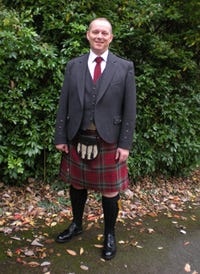David Dobie
Hi everyone,
Almost as soon as I had posted Paul Chiddicks' interview, his friend David wanted to get in on the action, so let's hear what he had to say for my questions...
1) What got you into genealogy & how long have you been researching for?
"I was adopted as a very young child by two wonderful people who will always be my ‘real’ mom and dad. While I had always known that I also had genetic parents, I rarely thought much about them.
In my early 20s I applied for my original birth certificate, but it only recorded my birth mother’s name and address in 1969. She had already passed away and I assumed that it would be impossible to find out more.
At the age of 47 (three years ago) I suddenly got curious. Through some very intensive research - and some extremely lucky breaks - my late birth father’s identity has been established; I’ve documented all my ancestors for at least five generations and I’ve met distant cousins and my only surviving uncle.
Genealogy has become the thing that fills every spare minute of my time. I love knowing about the people who all played a part in my history."
2) What interesting things have you discovered about your ancestors?
"All my ancestors come from Scotland, mostly from the counties of Ross-shire, Banffshire and Aberdeenshire. They were mostly agricultural labourers, crofters, or tenant farmers with a couple of blacksmiths, coachmen and a merchant seaman thrown in.I get the sense that they were hardworking people who concentrated on raising a family and providing for their children.
Most of my female ancestors are recorded as domestic servants or farmer’s wives. They probably worked even harder than their menfolk.
My maternal grandmother and two of her sisters were nurses. One of them did part of her nurse training at the same hospital in Manchester where I was a student nurse.
What has surprised me is how mobile people in Scotland were in the 19th century, presumably going where there was work available until they settled down.
What shouldn’t be a surprise is the number of illegitimate children, and first children born within a few months of their parents’ marriage. Apparently, casual sex wasn’t invented in the 1960s."
3) Who/What are you currently focusing on in your research?
"Writing-up the history of my direct line ancestors and their children in detail is fascinating. It’s a really good way to make sure one has got all the essential records and that everything checks-out. It is a great way of getting to know the people who went before you.
Earlier this year I joined the Guild of One-Name Studies and have started to document every single person with the surname ‘Moggach’ and its variants. The Moggachs seem to originate in the historic county of Banffshire. It isn’t a particularly common surname - I’ve identified 549 people born with the surname. I have a feeling I’m probably related to every single one of them"
4) Have you come across any difficulties while researching your family?(e.g. Conflicting sources)
"I think I’ve been lucky. Scotland’s statutory birth, marriage and death records were introduced in 1855. They are quite detailed and are generally extremely accurate. Things are harder with people who died before the 1841 Scotland Census, as the Old Parish Records, which are the major source of information, aren’t complete and the information recorded is quite variable.
Once one has realised that ‘Mac’ and ‘Mc’ are interchangeable, the spelling of surnames is very hit-and-miss, even on the same document. One of my lines spell their surname Wagrel, Wagarel, Waggrel or Wagrell from one record to the next. They are a good example of why wildcard and soundex searches are so helpful for on-line genealogists.
There are a few names in Scotland where it helps to know the variations. People born ‘Jane’ are regularly called ‘Jean’ when they appear on the census. ‘Janet’ often becomes ‘Jessie’ and ‘Margaret’ may be ‘Maggie’. Men tend to have fewer variations, though ‘Alexander’ can become ‘Sandy’."
5) What advice would you give to people wanting to start genealogy?"More than anything else, I’d think of genealogy as detective work where the challenge is to see how the evidence fits together. It should always feel like a challenge - if it doesn’t it’s OK to take a break from it.
The practical skill that I would recommend developing is recording one’s sources: Save copies of electronic documents and images with descriptive file names and find a system of organising records that works for you. There’s no guarantee that one will be able to remember where a document came from, or that on-line documents will still be there the next time you look for them.
Finally, I’d recommend making contact with other genealogists through social media. Twitter is great for genealogists and experienced family historians are extremely generous with their time and advice."
Link any social media or webistes you want featured
"On Twitter you’ll find me at @daviddobie2 and I’m a regular on the #AncestryHour Twitter-chat. The early work on my One-Name Study is at www.moggach.org.
For people researching their Scottish ancestry the records on ScotlandsPeople are invaluable. ScotlandsPlaces, Canmore and the National Library of Scotland’s Maps collections are all great for researching the geography of their ancestors’ country."
Now there you have it! Another fantastic review from another brilliant person. Big thanks to David for taking part. I would honestly like to take this moment to thank every person on Twitter, Instagram and those who have commented on my posts for all the likes, RTs, mentions and heartfelt comments sent to me. I can't thank you all enough for the support that I have received in response to my blog. Thank you. Stay tuned for more...



